- Home
- William Gibson
All Tomorrow's Parties bt-3 Page 14
All Tomorrow's Parties bt-3 Read online
Page 14
'It is about your will in the world, the man says and raises his arms, cupping the back of his head in his hands.
There follows a silence.
'There was a time, the voice says at last, 'when I believed that you were playing a game with me. That all of that was something you made up for me. To annoy me. Or amuse me. To hold my interest. To ensure my patronage.
'I have never been in need of your patronage, the man says mildly.
'No, I suppose not, the voice continues. 'There will always be those who need certain others not to be, and will pay to make it so. But it's true: I took you to be another mercenary, one with an expressed philosophy perhaps, but I took that philosophy to be nothing more than a way you had discovered of making yourself interesting, of setting yourself apart from the pack.
'Where I am, the man says to the gray neutral ceiling, 'there is no pack.
'Oh, there's a pack all right. Bright young things guaranteeing executive outcomes. Brochures. They have brochures. And lines to read between. What were you doing when I called?
'Dreaming, the man says.
'I wouldn't have imagined, somehow, that you dream. Was it a good dream?
The man considers the perfect blankness of the gray ceiling. Remembered geometry of facial bone threatens to form there. He closes his eyes. 'I was dreaming of hell, he says.
'How was it?
'An elevator, descending.
'Christ, says the voice, 'this poetry is unlike you. Another silence follows.
The man sits up. Feels the smooth, dark polished wood, cool through his black socks. He begins to perform a series of very specific exercises that involve a minimum of visible movement. There is stiff-ness in his shoulders. At some distance he hears a car go past, tires on wet pavement.
'I'm not very far from you at the moment, the man says, breaking the silence. 'I'm in San Francisco.
Now it is the man's turn for silence. He continues his exercises, remembering the Cuban beach, decades ago, on which he was first taught this sequence and its variations. His teacher that day the master of a school of Argentine knife-fighting most authoritatively declared nonexistent by responsible scholars of the martial arts.
'How long has it been, the voice asks, 'since we've spoken, face-to-face?
'Some years, says the man.
'I think I need to see you now. Something extraordinary is on the verge of happening.
'Really, says the man, and no one sees his brief and wolfish smile, 'are you about to become contented?
A laugh, beamed down from the secret streets of that subminiature cityscape in geosynchronous orbit. 'Not that extraordinary, no. But some very basic state is on the brink of change, and we are near its locus.
'We? We have no current involvement.
'Physically. Geographically. It's happening here.
The man moves into the final sequence of the exercise, remembering flies on the instructor's face during that initial demonstration.
'Why did you go to the bridge last night?
'I needed to think, the man says and stands.
'Nothing drew you there?
Memory. Loss. Flesh-ghost in Market Street. The smell of cigarettes in her hair. Her winter lips chill against his, opening into warmth. 'Nothing, he says, hands closing on nothing.
'It's time for us to meet, the voice says.
Hands opening. Releasing nothing.
32. LOWER COMPANIONS
THE back of the van collected a quarter-inch of water before the rain quit. 'Cardboard, Chevette told Tessa.
'Cardboard?
'We'll find some, dry. Boxes. Open 'em out, put down a couple of layers. Be dry enough.
Tessa clicked her flashlight on and had another look. 'We're going to sleep in that puddle?
'It's interstitial, Chevette told her.
Tessa turned the light off, swung around. 'Look, she said, pointing with the flashlight, 'at least it isn't pissing down now. Let's go back to the bridge. Find a pub, something to eat, we'll worry about this later. Chevette said that would be fine, just as long as Tessa didn't bring God's Little Toy, or in any other way record the rest of the evening, and Tessa agreed to that.
They left the van parked there, and walked back along the Embarcadero, past razor wire and barricades that sealed (ineffectually, Chevette knew) the ruined piers. There were dealers in the shadows there, and before they'd gotten to the bridge they were offered speed, plug, weed, opium, and dancer. Chevette explained that these dealers weren't sufficiently competitive to take and hold positions farther along, nearer the bridge. Those were the coveted spots, and the dealers along the Embarcadero were either moving toward or away from that particular arena.
'How do they compete? Tessa asked. 'Do they fight?
'No, said Chevette, 'it's the market, right? The ones with good shit, good prices, and they turn up, well, the users want to see them. Somebody came with bad shit, bad prices, the users drive 'em off. But you can see them change, when you live here; see 'em every day, most of that stuff, if they're using themselves, it'll take 'em down. Wind up back down here, then you just don't see 'em.
'They don't sell on the bridge?
'Well, Chevette said, 'yeah, they do, but not so much. And when they do, they're quieter about it. You don't get offered on the bridge, so much, not if they don't know you.
'So how is it like that? Tessa asked. 'How do people know not to? Where does the rule come from?
Chevette thought about it. 'It isn't a rule, she said. 'It's just you aren't supposed to do it. Then she laughed. 'I don't know: it's just like that. Like there aren't too many fights, but the ones there are tend to be serious, and people get hurt.
'How many people actually live out here? Tessa asked as they walked up the ramp from Bryant.
'I don't know, Chevette said. 'Not sure anyone does. Used to be, everyone who did anything here, who had a business going, they lived here. 'Cause you have to. Have to be in possession. No rent or anything. Now, though, you get businesses that are run like businesses, you know? That Bad Sector we were in. Somebody owns all that stock, they built that storefront, and I bet they pay that sumo boy to sleep in the back, hold it down for them.
'But you didn't work here, when you lived here?
'Nah, Chevette said, 'I was messin', soon as I could. Got myself a bike and I was all over town.
They made their way into the lower level, past boxes of fish on ice, until they came to a place Chevette remembered on the south side. It had food sometimes, sometimes music, and it had no name.
'They do good hot wings in here, Chevette said. 'You like hot wings?
'I'll let you know after I've had a beer. Tessa was looking around at the place, like she was trying to decide how interstitial it was.
It turned out they had an Australian beer Tessa really liked, called a Redback, came in a brown bottle with a red spider on it, and Tessa explained that these spiders were the Australian equivalent of a black widow, maybe worse. It was a good beer though, Chevette had to agree, and after they'd both had one, and ordered another, Tessa ordered a cheeseburger, and Chevette ordered a plate of hot wings and a side of fries.
This place really smelled like a bar: stale beer, smoke, fry grease, sweat. She remembered the first bars she'd ever gone into, places along rural highways back up in Oregon, and they'd smelled like this. The bars Carson had taken her to in LA hadn't smelled like anything much. Like aromatherapy candles, sort of.
There was a stage down at one end, just a low black platform raised about a foot above the floor, and there were musicians there, setting up, plugging things in. There was some kind of keyboard, drums, a mike stand. Chevette had never been that much into music, not any particular kind, although in her messenger days she'd gotten to like dancing in clubs, in San Francisco. Carson, though, he'd been very particular about what music he liked, and had tried to teach Chevette to appreciate it like he did, but she just hadn't gotten with it at all. He was into this twentieth-century stuff, a lot of it F
rench, particularly this Serge Something, really creepy-ass, sounded like the guy was being slowly jerked off while he sang, but like it really wasn't even doing that much for him. She'd bought this new Chrome Koran, 'My War Is My War, sort of out of self-defense, but she hadn't even liked it that much herself, and the one time she'd put it on, when Carson was there, he'd looked at her like she'd shit on his broadloom or something.
These guys, now, setting up on the little stage, they weren't bridge people, but she knew that there were musicians, some of them famous, who'd come out and record on the bridge just so they could say they had.
There was a big man up there, with a white, stubbly face and a sort of mashed-up cowboy hat on the back of his head. He was fiddling with an unplugged guitar and listening to a smaller man in jeans, wearing a belt buckle like an engraved silver dinner platter.
'Hey, Chevette said, indicating the bottle-blonde man with the belt buckle, 'this girl gets molested in the dark, tells 'em it was a meshback did it. 'Well, they say, 'how you know it was, if it was dark? ''Cause he had a tiny little dick and a great big belt buckle!
'What's a meshback? Tessa tilted back the last of her beer.
'Redneck, Skinner called 'em, Chevette said. 'It's from those nylon baseball caps they used to wear, got black nylon mesh on the back, for ventilation? My mother used to call those 'gimme' hats.
'Why? Tessa asked her.
''Gimme one them hats. Give 'em away free with advertising on them.
'Country music, that sort of thing?
'Well, more like Dukes of Nuke 'Em and stuff. I don't think that's country music.
'It's the music of a disenfranchised, mostly white proletariat, Tessa said, 'barely hanging on in post-post-industrial America. Or that's what they'd say on Real One. But we have that joke about the big buckles in Australia, except it's about pilots and wristwatches.
Chevette thought the man with the belt buckle was staring back at her, so she looked in the other direction, at the crowd around the pool table, and here there actually were a couple of the meshbacked hats, so she pointed these out to Tessa by way of illustration.
'Excuse me, ladies, someone said, a woman, and Chevette turned to face directly into the line of fire of some very serious bosom, laced up into a shiny black top. Huge cloud of blowsy blonde hair a la Ashleigh Modine Carter, who Chevette thought of as a singer meshbacks would listen to, if they listened to women, which she wasn't certain they did. The woman put two freshly opened Redbacks down on their table. 'With Mr. Creedmore's compliments, she said, beaming at them.
'Mr. Creedmore? Tessa asked.
'Buell Creedmore, honey, the woman said. 'That's him over there getting ready to do the sound check with the legendary Randy Shoats.
'Is he a musician?
'He's a singer, honey, the woman said and seemed to look more closely at Tessa. 'You A&R?
'No, Chevette said.
'Damn, the woman said, and Chevette thought for a second she might take the beers back. 'I thought you might be from an alternative label.
'Alternative to what? Tessa asked.
The woman brightened. 'Buell's singing, honey. It isn't like what you probably think of as country. Well, actually, it's a 'roots' thing. Buell wants to take it back, back there past Waylon and Willie, to some kinda dark 'primal kinda heartland. Kinda. Thing. The woman beamed, eyes slightly unfocused. Chevette got the feeling that all of that had been memorized, and maybe not too well, but that it was her job to get it out.
'Randy, he was teaching Buell one earlier, called 'There Was Whiskey and Blood on the Highway, but I Didn't Hear Nobody Pray'. That's a hymn, honey. Very traditional. Give me goosebumps to hear it. I think it's called that, anyway. But tonight's set is going to be 'more upbeat, electric.
'Cheers, Tessa said, 'that for the lager.
The woman looked puzzled. 'Oh. You're welcome, honey. Please do stick around for the set. It's Buell's Northern California debut, and the first time he's actually sung with his Lower Companions.
'His what? Chevette asked.
'Buell Creedmore and his Lower Companions. I think it's a biblical reference, though I can't quote you chapter and verse. The woman pointed her straining bosom toward the stage and resolutely followed it in that direction.
Chevette didn't really want another beer. 'She bought us these because she thought we were A&R. She knew about that because of Carson. A&R were the people in the music business who found and developed talent. Tessa took a pull on her beer and watched the woman, who'd stopped to talk to one of the boys from the pool table, one of the ones who was actually wearing a meshbacked cap. 'Do people like her live here?
'No, Chevette said, 'there's clubs in the city for this kind of thing, or sort of like it, but I've never seen a crowd like this out here before.
The sound check consisted of the man with the squashed cowboy hat playing guitar and the man with the belt buckle singing. They stopped and started a few times, on the one song they did, for various twiddlings of knobs, but the guitarist could really play (Chevette got the feeling he wasn't really letting it out yet, what he could do) and the singer could sing. It was a song about being sad and being tired of being sad,
The bar, meanwhile, was starting to fill up, with what looked to be a bunch of locals, regulars, and a hunch who weren't, who were here to hear the hand. The locals tended to tattoos, facial piercings, and asymmetrical haircuts, while the visitors tended to hats (meshback and cowboy, mostly), jeans, and (on the men, anyway) guts. The guts tended to be the kind that looked as though they had moved in while their owners were unaware and had taken up residence on otherwise fat-free frames. The kind of gut that hangs over the top of a pair of jeans with a reasonably small waistband, swelling the front of a flannel shirt but cinched back in, below, with one of those big buckles.
She'd started on Creedmore's Redback out of boredom, when she spotted the singer himself headed their way. He had borrowed someone's meshbacked cap and pulled it on backward, over his weirdly wet-looking bleach-blonde hair. He was wearing an electric-blue cowboy shirt with the store creases still in it, horizontal across the chest, and the white pearlized snaps open halfway down the front, revealing a pale, white, decidedly concave chest that wasn't at all the color of his face, which she figured was painted on. He had what looked like tomato juice in each hand, in a tall glass with ice. 'How do, he said. 'Saw that Maryalice over here. Thought I'd bring the old girl a drink. I'm Buell Creedmore. You ladies enjoyin' your beer?
'Yes, thanks, said Tessa and looked in the opposite direction. Creedmore did a quick, and to Chevette very obvious, piece of mental calculation, Chevette coming up as the one more likely to be profitably hit on. 'You hear about us in the city here or over in Oakland?
'We're just here for the hot wings, Chevette said, indicating the plate of chicken bones in front of her.
'They any good?
'They're okay, Chevette said. 'But we're just leaving.
'Leaving? Creedmore took a big swig of his tomato juice. 'Hell, we're on in ten. You oughta stay 'n' hear us. There was some weird-looking, greenish-sandy stuff, Chevette saw, around the rims of the glasses, and now some of this was stuck on Creedmore's upper lip.
'What you doin' with those Caesar's, Buell? It was the big guitarist. 'Now you promised me you wouldn't drink before the set.
'For Maryalice, Creedmore said, gesturing with a glass, 'and this here's for the pretty lady. He put the one he'd had the swig from down in front of Chevette.
'So how come you got that garlic salt on your mouth? the big man asked.
Creedmore grinned and wiped the back of his hand across his mouth. 'Nerves, Randy. Big night. Gonna be okay.
'It better be, Buell. I don't see some evidence you can hold your liquor, be the last gig you ever play with me. The guitarist took the drink out of Creedmore's hand, took a sip, made a face, and walked off, taking the drink with him.
'Sons of bitches, Creedmore said.
And it was at this point that Chevett
e saw Carson enter the bar. Recognition, on her part, was instantaneous and one-hundred-percent positive. It was not Carson as dressed for lounges that smelled like aromatherapy, but Carson dressed for the knowing exploration of the lower reaches.
Chevette had actually been with him when he bought this outfit, so she'd had to hear about how the jacket was Alaskan steerhide (Alaskan steers having thicker hides, due to the cold winters), and a museum-grade reproduction of a 1940s original. The jeans were nearly as expensive, and more complicated in their sourcing, the denim woven in Japan on ancient, lovingly maintained American looms and then finished in Tunisia to the specifications of a team of Dutch designers and garment historians. This was the kind of stuff that Carson cared deeply about, this absolutely authentic fake stuff, and when Chevette saw him step through that entrance, she had absolutely no doubt that it was him.
And also, though she couldn't have said exactly how, she knew that she was in trouble. Maybe, she'd think later, it had been because he hadn't known she was looking, so he hadn't really been bothering to be the guy he had always pretended to be when he was with her, when he'd known she was looking.
It was like seeing a different guy, a very scary, very cold, very angry guy, and knowing it was Carson. Carson turning to scan the bar. What she did next surprised her. It must have surprised Creedmore even more. The top of the huge silver buckle made a convenient handle. She grabbed it, pulled, and brought him down, loose-kneed, to kiss his mouth, throwing her arms around his neck and hoping the back of his head, in the backward meshback hat, was between her face and Carson's.
Creedmore's ready enthusiasm was, unfortunately, about what she'd have expected, had she had the time to think.
33. DURIUS
RYDELL was midway back, through that lower-level crunch, when his sunglasses rang. He got his back to the nearest wall, took them out, opened them, put them on.

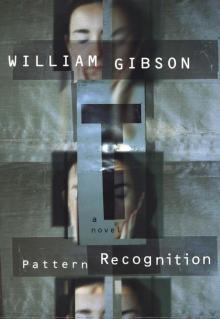 Pattern Recognition
Pattern Recognition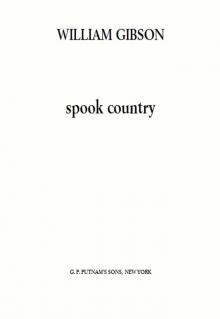 Spook Country
Spook Country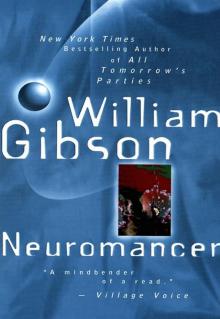 Neuromancer
Neuromancer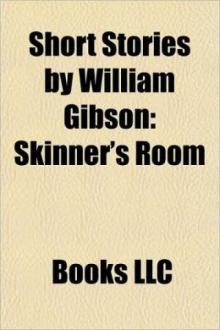 Skinner's Room
Skinner's Room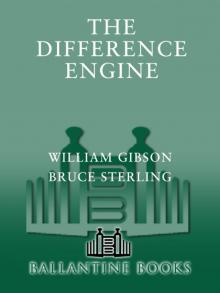 The Difference Engine
The Difference Engine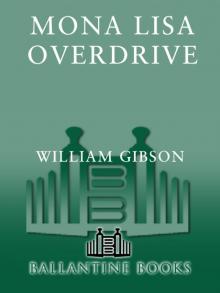 Mona Lisa Overdrive
Mona Lisa Overdrive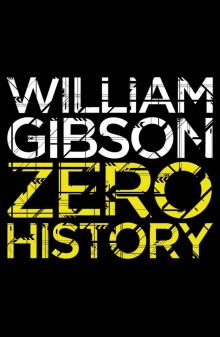 Zero History
Zero History The Peripheral
The Peripheral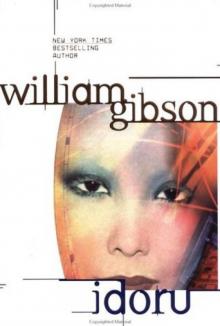 Idoru
Idoru Johnny Mnemonic
Johnny Mnemonic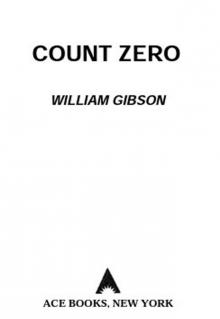 Count Zero
Count Zero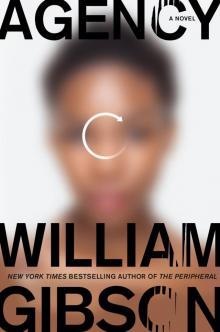 Agency
Agency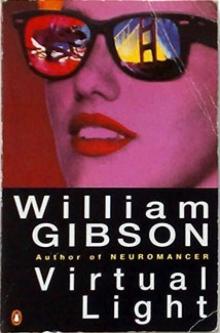 Virtual Light
Virtual Light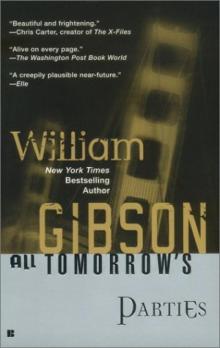 All Tomorrow's Parties
All Tomorrow's Parties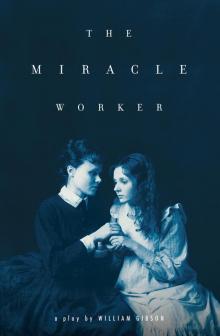 The Miracle Worker
The Miracle Worker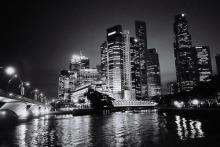 Disneyland with the Death Penalty
Disneyland with the Death Penalty Idoru tb-2
Idoru tb-2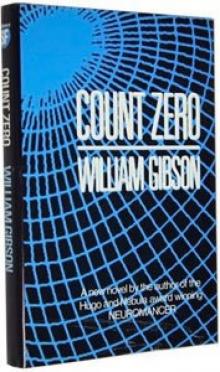 Count Zero s-2
Count Zero s-2 The Gernsback Continuum
The Gernsback Continuum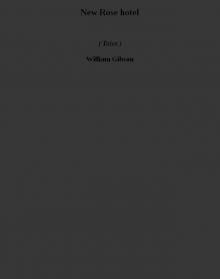 New Rose hotel (tales)
New Rose hotel (tales)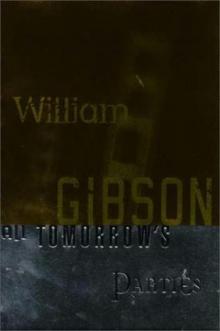 All Tomorrow's Parties bt-3
All Tomorrow's Parties bt-3 Hinterlands
Hinterlands Thirteen Views Of A Cardboard City
Thirteen Views Of A Cardboard City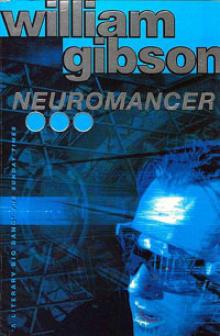 Neuromancer ts-1
Neuromancer ts-1 Virtual light b-1
Virtual light b-1